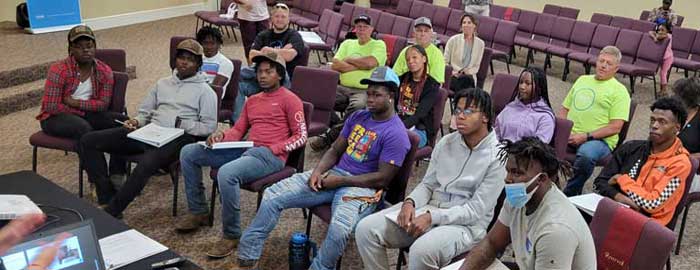
Lowndes County, Ala. — The International Water, Sanitation, and Hygiene Foundation (IWSH) returned to Lowndes County, Alabama, recently to teach local high school students how to conduct household plumbing surveys that assess the quality and function of homes’ plumbing systems.
IWSH has been working in Lowndes County for the past few years with LIXIL Americas, FujiClean USA, and the Black Belt Unincorporated Wastewater Program (BBUWP) as part of a larger initiative to improve homes’ water efficiency and sanitation system functions. IWSH led a training with 12 high school students from Central High School and Calhoun High School in Lowndes County. Apprentices from Plumbers & Steamfitters Local Union 91 constructed product demonstration boards that included faucets, pipes and other fixtures so the students could get hands-on experience and learn about home plumbing systems. The high schoolers were also taught how to use the IWSH Household Plumbing Survey, a tool that assesses the efficacy of indoor plumbing systems.
“IWSH’s survey provides the necessary information to guide home plumbing repairs, helping us to create a more sustainable wastewater program,” BBUWP Executive Director Sherry Bradley said. “The training IWSH led for the local high school students will equip teenagers with the education and tools to conduct these surveys and perform a much-needed service in their own community. We see these kids learning the correct words about plumbing systems and understanding what’s not working within homes, and why. The students are now an integral part of improving people’s quality of life in Lowndes County.”
Based on the IWSH Household Plumbing Surveys, IWSH and LIXIL Americas staff were able to analyze the repairs needed in each home surveyed. IWSH then created job sheets that provided guidance for volunteer plumbers from the United Association of Journeymen and Apprentices of the Plumbing and Pipefitting Industry of the United States and Canada Locals 52, 91, 760, and South Central Pipe Trades — who are licensed in Alabama — to upgrade fittings, fixtures and appliances in selected homes using water-efficient products donated by LIXIL Americas.
“We know there are a lot of homes that need support; people deserve access to adequate sanitation and functioning plumbing systems with water-efficient technologies,” said Mike Webster, leader, project management for LIXIL Americas. “In October 2022, IWSH came to Lowndes County to pilot their Household Plumbing Survey with four high school students. The information they gathered allowed BBUWP, IWSH and LIXIL to better understand which repairs were needed and which materials LIXIL needed to provide. This visit, IWSH trained more students and surveyed more homes, which will eventually help LIXIL achieve our goal of upgrading indoor plumbing systems of 100 homes throughout Lowndes County.”
The U.S. Environmental Protection Agency (EPA) and the Department of Agriculture Rural Development (USDA-RD) have prioritized this type of work in their Closing America’s Wastewater Access Gap Community Initiative. More recently the Department of Justice has directed the Alabama Department of Public Health to conduct a variety of actions to address public health in Lowndes County.
“IWSH will continue to work in this area to help improve household plumbing systems and advance septic needs,” said Robyn Fischer, senior director of IWSH North America. “As part of this program, IWSH is training young people to use the Household Plumbing Survey, which will inform job sheets for licensed plumbers so they can perform the necessary repairs in homes throughout the county. It’s incredible to watch the students learn about the importance of water efficiency, understand how inadequate septic systems pose threats to people’s health, and see them develop an interest in plumbing. By supporting community involvement and local leadership, along with the vital work spearheaded by BBUWP and other partners, we can help improve access to more sustainable sanitation solutions and address public health issues.”